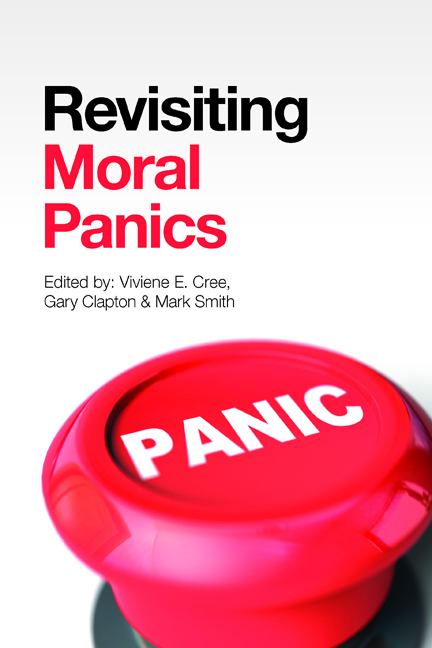Book contents
- Frontmatter
- Contents
- Contributors
- Preface
- Commentary moral panics yesterday, today and tomorrow
- Part One Gender and the family
- Part Two Moral panics in our time? Childhood and youth
- Part Three The state, government and citizens
- Part Four Moral crusades, moral regulation and morality
- Afterword the moral in moral panics
- Conclusion Moral panics and beyond
- Index
Afterword:when panic meets practice
Published online by Cambridge University Press: 08 March 2022
- Frontmatter
- Contents
- Contributors
- Preface
- Commentary moral panics yesterday, today and tomorrow
- Part One Gender and the family
- Part Two Moral panics in our time? Childhood and youth
- Part Three The state, government and citizens
- Part Four Moral crusades, moral regulation and morality
- Afterword the moral in moral panics
- Conclusion Moral panics and beyond
- Index
Summary
I am an independent social work practitioner and commentator with a particular interest in the interface between research, policy and practice. In 2014 I was appointed as Chair of the Policy, Ethics and Human Rights Committee of the British Association of Social Workers and look forward to contributing to the promotion of ethical practice and the continuing development of professional opinion and policy. Moral panics that influence social work and social workers are clearly well within the scope of this committee and the contributions on family and gender in this part are of great relevance to future discussion and work.
In this afterword, I have chosen to reflect particularly on the issues of widening definitions of abuse and harm, and grounds for interference and regulation of private and family life, which are raised particularly by the contributions by Tartari (Chapter One) and Waiton (Chapter Five). These chapters both describe the ways that moral panics have allowed the greater encroachment of government into private and intimate relationships. Family life has, they argue, been gripped by a succession of moral panics about everything from satanic or ritual abuse to rioting youth. Waiton goes as far as to assert that the family is ‘a new site for amoral elite anxieties’. Gender relations are currently at the heart of a number of contemporary scandals, often played out as criminal trials of historical events. Tartari explores the ways in which child abuse and gender panics have the apparently paradoxical effect of over-emphasising the vulnerability of women and children and the villainy of men, to the advantage of opportunistic politicians. The contributions of Mannay (Chapter Two), Beddoe (Chapter Three) and Brown (Chapter Four) all provide additional insights into increasing government interest in, and attempts to control, family life and personal relations and the impact that this has on both individuals and families.
Suspicion of families (as ‘hotbeds’ of both gender and generational abuse and neglect) is now a generally accepted starting-point for social work contact with families. At a time when working and welfare poverty, malnutrition and homelessness are all increasing, so ‘child protection’ is now the main, if not the only, reason for social workers to be involved with families.
- Type
- Chapter
- Information
- Revisiting Moral Panics , pp. 59 - 66Publisher: Bristol University PressPrint publication year: 2015



